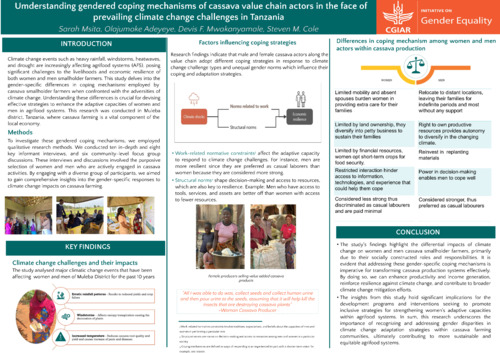Understanding gendered coping mechanisms of actors within cassava production in the face of prevailing climate change challenges in Tanzania
Abstract
Prominent climate change events such as heavy rainfall, windstorms, heatwaves, and drought pose detrimental effects on the livelihoods and resilience of women and men actors in agri-food systems (AFS). This study explored the difference in coping mechanisms employed by women and men cassava smallholder farmers in the face of such climate change adversities. Qualitative research methods were adopted through conducting 10 in-depth interviews, eight key informant interviews, and six communitylevel focus group discussions with purposively selected women and men cassava actors in Muleba district in Tanzania. The preliminary findings highlight men reinvesting in replanting cuttings and relocating to distant locations, leaving their families for indefinite periods without support. In households where men relocate leaving their families, women are burdened with extra responsibilities caring for their family members. They are forced to diversify into additional income-generating activities, including opting for short-term crops to ensure food and nutrition security. Some older women used indigenous knowledge by sanitizing cassava cuttings with human urine to control root rot diseases, caused by climate change, to build resilience. The findings suggest that women and men experience climate change impacts differently due to their socially constructed roles and responsibilities. Providing better understanding of gendered coping mechanisms is essential for transforming cassava production system. This will increase productivity and incomes, build resilience to adapt to climate change and contribute to climate change mitigation. Findings from this study have significant implications for development interventions targeting inclusive efforts to build women’s adaptive capacities in agri-food systems.

